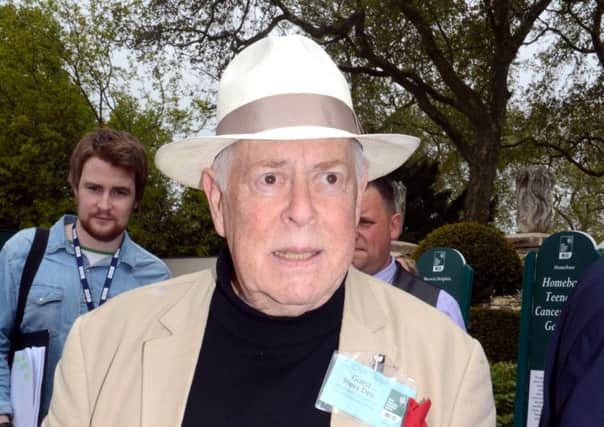Obituary: Clive Swift, actor who had mixed feelings about his fame in Keeping Up Appearances


As Richard, husband of Hyacinth Bucket (it is pronounced Bouquet apparently), Clive Swift had to smile sweetly and suffer in silence for years on the hit 1990s sitcom Keeping Up Appearances. In real life he felt no such restraints and had a reputation as a man who did not suffer fools, journalists or even fans gladly.
“They expect me to be as nice and placid as Richard and I’m not really like that,” said the actor, who was a contemporary of Derek Jacobi and Ian McKellen in Cambridge University’s dramatic society and spent a decade with the Royal Shakespeare Company. “I could walk around unrecognised, but all that changed with Keeping Up Appearances… sometimes I tell them to f*** off,” he admitted.
Advertisement
Hide AdAdvertisement
Hide AdAlthough it is as Richard Bucket that Swift will be most readily and probably most fondly remembered, there was a lot more to his career than one hit sitcom and he appeared in two Doctor Who stories.
An interview with Doctor Who Magazine about his appearance in the second one, Voyage of the Damned (2007), prompted a great deal of interest and amusement when it turned up on the internet last year. DigitalSpy, the showbiz site announced the news with the headline “Hilariously grumpy Doctor Who interview resurfaces.”
Swift commented about the unnamed interviewer’s lack of shorthand and told them to read the script when they asked what his character was like. “What a silly question,” he said.
Sounding more like Victor Meldrew than mild-mannered Richard Bucket, he pointed out he was not getting paid for the interview and added: “There’s no reason why I should talk to you at all… I know that you all think that thing is a big world, this Who business, but it isn’t. There are much bigger things than this.”
Swift was a regular visitor to Scottish theatres, appearing in an RSC production of The Physicists at the King’s in Edinburgh in 1963. Six years later he played the title role in The Young Churchill in the London West End and then Edinburgh’s Lyceum.
He was reunited with Derek Jacobi in Richard III at the MacRobert Centre in Stirling in 1972 in a production by the Prospect Theatre Company, which became the Old Vic Theatre Company.
On television Swift was memorable as Bishop Proudie, another character with an overbearing wife, in a delightful 1982 BBC adaptation of Trollope’s The Barchester Chronicles, with Donald Pleasence and Nigel Hawthorne.
On the big screen he was King Arthur’s adoptive father Sir Ector in John Boorman’s Excalibur (1981) and the doctor who attends the distraught protagonist, who may or may not have been sexually assaulted, in David Lean’s A Passage to India (1984).
Advertisement
Hide AdAdvertisement
Hide AdThe second of four children, he was born Clive Walter Swift in Liverpool in 1936. His parents owned a local furniture shop. His elder brother was David Swift, who also became an actor and played the grumpy newsreader Henry Davenport on the sitcom Drop the Dead Donkey.
Swift studied English at Cambridge, where his life revolved largely around acting and his inner circle included Jacobi, McKellen and Margaret Drabble. He married Drabble in 1960 and lived in Stratford-upon-Avon, where they both acted with the newly formed Royal Shakespeare Company.
Drabble was of course to enjoy greater success as a novelist. Her second novel The Garrick Year (1964) drew on personal experience and poked fun at actors and their world.
With his receding hairline and a slightly goofy or bewildered expression, Swift was never likely to make it as a leading man in movies. But in the middle of his RSC years he did make a slightly unlikely film debut with the pop group The Dave Clark Five in the light-hearted John Boorman movie Catch Us If You Can (1965).
He also appeared in many rather more weighty Shakespeare and historical roles on television, including that of Snug in A Midsummer Night’s Dream (1968), as part of a cast that included Diana Rigg and Helen Mirren.
He had a small part in Alfred Hitchcock’s second last film Frenzy (1972), which shot in London. He played the friend of Jon Finch, in the role of the perennial fugitive who must prove his innocence. Hitchcock had some succinct advice for Swift on how to play his character: “You just come in, say your line and go away.” Swift would later play the famous director in a radio play.
Swift had built a very solid resume on stage and screen by the time Keeping Up Appearances came along. There were five series between 1990 and 1995. Although he had misgivings about the fame it brought him, he did appreciate the cheques.
“That show is the only proper money I’ve earned, because it was a global success and it’s given me a good pension that I might never have had,” he said.
Advertisement
Hide AdAdvertisement
Hide AdIn the late 1970s he helped found the Actors Centre, a meeting place for out-of-work actors, and in his spare time he wrote music and played piano, played tennis and enjoyed watching Arsenal and Lancashire cricket club.
He and Drabble divorced in 1975, but remained friends. She survives him along with their sons Adam, professor of political theory at University College London, and Joe, who presents BBC’s Gardener’s World. A daughter died two years ago.
Brian Pendreigh